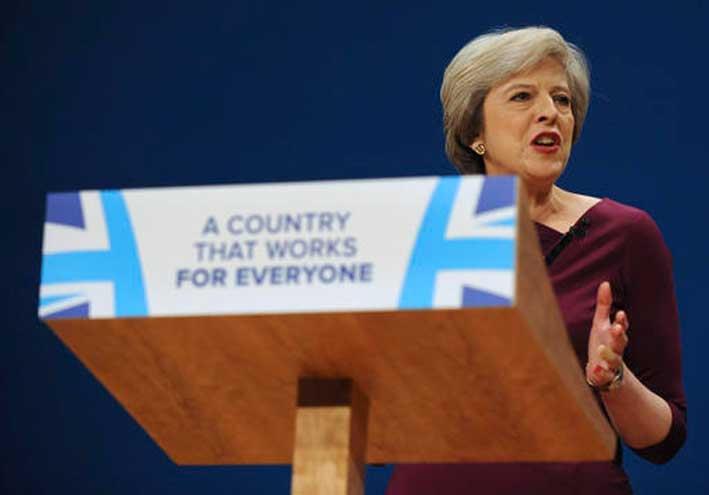U.K. Prime Minister Theresa May laid out the shape, if not the detail, of her vision for Britain on Wednesday, saying government should play a bigger role in people's lives than it has under some of her Conservative predecessors.
May told the Conservative Party's annual conference that she would govern from "the new center ground of British politics, built on the values of fairness and opportunity."
Her version of the center ground adopted ideas from both the left and the right. On one hand, May promised curbs on immigration and on generous welfare benefits. On the other, she vowed to improve workers' rights and control exploitative capitalists.
"A change has got to come, and we are going to deliver it," May said.
May was elected Conservative leader after Britons voted June 23 to leave the European Union - against the advice of Prime Minister David Cameron, who resigned after the result.

Although she had served in Cameron's Cabinet for six years, most voters knew little of May's ideas or passions. In a speech intended to remedy that, May called the referendum result "a quiet revolution" by people who have not benefited from globalization or rapid economic change.
May, like Cameron, backed the losing "remain" side in the referendum, but said Britain's EU exit provided "a once-in-a-generation chance to change the direction of our nation for good."
In a striking change of tone from Cameron - who combined social liberalism with fiscal austerity and light-touch economic regulation - May attacked corporate bosses who dodge tax and raid employees' pension funds.
She signaled she would take a more interventionist economic approach, saying "government can and should be a force for good."
She said the government would open more selective schools to improve education, invest in large-scale infrastructure projects, fight racial discrimination and build "a country that works for everyone," regardless of race, religion, parentage or place of birth.

In a populist pitch to those who voted to leave the EU - including supporters of the right-wing U.K. Independence Party - May criticized elites who find patriotism "distasteful" and "concerns about immigration parochial."
Some have accused the Conservatives of pandering to xenophobia with promises to impose new curbs on immigration and promote British workers over foreign ones. Home Secretary Amber Rudd said Tuesday that companies could be forced to disclose what percentage of their workforce was from other countries.
May repeated her intention to launch formal exit talks with the EU by the end of March. She said Britain would seek to retain a close relationship with the bloc, with continued free trade in goods and services. But she said the U.K. would not cede control over immigration, a conflict with the EU's principle of free movement that could prove a sticking point in negotiations.
Hundreds of thousands of European workers have moved to Britain in the last decade - and hundreds of thousands of Britons also live in other EU countries.
May said the U.K. would not "retreat from the world" when it leaves the EU, instead becoming "a confident global Britain that doesn't turn its back on globalization but ensures the benefits are shared by all."
May's speech struck a stark contrast with Britain's only other female prime minister, Margaret Thatcher, an enthusiastic free-marketeer who once said "there is no such thing as society," only individuals and families.
"There is more to life than individualism and self-interest," May said. She even praised taxes, saying "tax is the price we pay for living in a civilized society."
Political opponents were unimpressed. Labour Party lawmaker John Ashworth said May had finally laid out her vision- and it was "not optimistic about the future but small, mean and nasty."